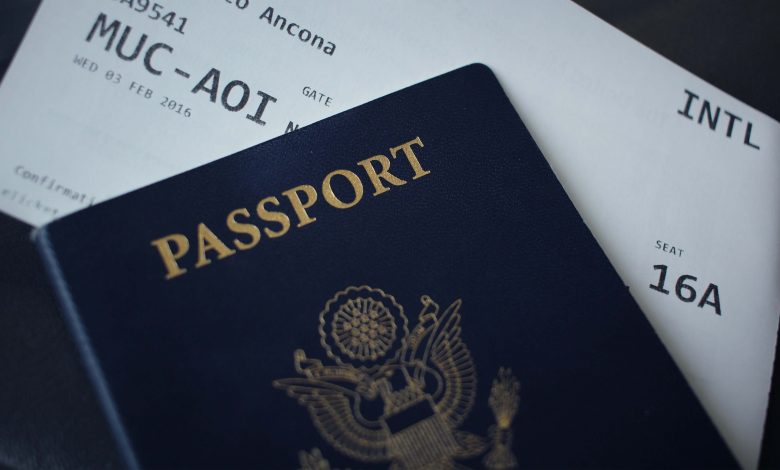Can A Felon Get A Passport? Traveling After Conviction

Traveling as a Felon
If you have a felony on your criminal record, you may be wondering can a felon get a passport? Contrary to popular belief, having a felony will not affect your ability to travel abroad. Keep in mind, there are still other reasons the U.S. State Department could deny you a passport, such as the type of conviction you have, open arrest warrants, and child support status. There are also a few countries that restrict entry on travel visas for people with certain types of convictions. Overall, you should be able to get a U.S. passport for travel in a few simple steps.
How Much Does a Passport Cost?
The fees to getting a passport vary depending upon how old you are, how fast you need it, and what type of passport you wish to get. For the purposes of this application, adults are defined as anyone over the age of 16. There is also an application execution fee to consider. You can opt for a full passport booklet, a passport card, or both. A passport booklet can be used for travel by air, land, or sea to any country outside of the United States, provided you possess any appropriate visa from the visiting country. A passport card can only be used to travel by land or sea to and from Canada, Mexico, the Caribbean, and Bermuda.
As of 2020, U.S. passport fees are:
- Adult Passport Book – $110
- Adult Passport Card – $30
- Adult First Time Applicant Execution Fee – $35
- Child Passport Book – $80
- Child Passport Card – $15
- Child First Time Applicant Execution Fee – $35
- 2-3 Week Expedited Service Fee – $60
- 1-2 Day Delivery – $16.48
Different payment methods are available depending upon the location you are applying at. If you submit your application at an official passport agency, you can pay your fees with any major credit or debit card, personal or cashier’s check, money order, or cash. If you’re applying at a passport acceptance agency like your local post office, you will only be able to pay with a personal or cashier’s check, or money orders. The same goes if you’re applying by mail. Luckily, you can purchase your money order with cash right at the postal window.

How to Get a Passport with a Felony Conviction
Applying for a U.S. passport as a felon is the same as someone without a criminal record. If you’re unfamiliar with the process, follow these steps to apply for and get your passport.
- Find your local passport agency or U.S. Post Office with passport service. At either location, you will find paper passport applications (Form DS-11) with a list of required documents you will need to bring with you when you turn it in. You can also print the form and bring it with you. These documents are different for every situation, but include:
- Valid state-issued photo identification – You will also need to make photocopies of the front and back to leave with your application.
- Proof of U.S. citizenship, such as a certified birth certificate – A certified birth certificate will have a raised seal stamped somewhere in the paper. If your birth certificate is old, tattered, or just missing the certification seal, you’ll want to order a new one to avoid any delays with your passport application. You will need the original and a photocopy of the front and back. They will mail back your original birth certificate to you after they process your application.
- You will need to have your passport fee in the acceptable form for the location you’re visiting.
- Review the form and complete it with absolute honesty. Any discrepancies could cause your application to be denied and your application fee forfeited. The form will ask you to fill out information about yourself and your parents, including date and place of birth. It is also important that you do not sign the form until a passport agent tells you to. Signing it ahead of time will void the application, and you will have to fill it out again.
- Bring passport photos. These are front-facing photos of you from the shoulders up taken within the last six months. If you didn’t bring proper passport photos with you, the passport office can take them on site for a fee. This fee is usually much more than if you were to have them taken at your local 24-hour photo or taken them yourself.
- Sign and submit your application. The passport agent will ask you to swear under oath that the information on the application is true and sign the application in front of them.
- Wait for your passport to come in the mail. According to the U.S. Department of State website, regular processing times for a new passport application is six to eight weeks. For an added fee, you can have your mailed application expedited to receive your passport within two to three weeks, or eight business days if you visit a local passport agency. If you need it sooner than that, you may set an appointment to have a same day or next day passport service.

What to Do If Your Passport Application Is Delayed or Denied
After you apply for your passport, one of two things will happen. You will either receive your new passport or a letter explaining why your application was delayed or denied. Either way, they will return your certified birth certificate to you immediately. Depending on the outcome, you may need to take additional steps to secure a new passport.
There are several reasons they may delay your passport application. The most common is having incorrect information or an incomplete application. Your passport agent will usually double-check the application to ensure that it’s complete before submitting it. However, they can’t know if the information is correct. It’s important that you double check the information.
If you find your U.S. passport application was denied, you still have options. First is to determine the reason for denial and work to remedy the situation.
Reasons your passport was denied include:
- You have a federal or state felony drug-trafficking conviction and are currently imprisoned or on parole.
- You have active arrest warrants.
- You owe more than $2,500 in child support payments.
- You are a minor under the age of 16 without the consent of both custodial parents.
- You have unpaid federal taxes or loans.
Felony or State Drug Trafficking Convictions
There is only one felony conviction that may hinder your ability to get a passport and travel abroad. If you have been convicted of drug trafficking at either the federal or state level, the law places limits on your ability to apply for and even possess a U.S. passport. According to U.S. Code 22 U.S. Code § 2714, any person who is convicted of a federal or state felony drug trafficking where they crossed an international border during the commission of the crime is ineligible to apply for a passport. The period of ineligibility begins once the person is convicted and ends once they have been released and/or completed parole.
This code also states that individuals who meet these standards and were previously issued a passport shall have their valid passport revoked. This does not mean the Secretary of State will actively seek you out to take your passport back. Instead, if you do try to leave the country during this time, customs agents will then be instructed to take your passport from you. If you are on parole at the time of the attempt, you will be up for immediate arrest.
However, there is hope. Once a person convicted of felony drug trafficking has completed their prison or parole sentence, they will again be eligible. Felons who have had their passports revoked will also need to apply for a new passport.
Active Arrest Warrants
Probably the quickest way to have your application denied is by having active warrants out for your arrest. The cause for the arrest warrant is not a factor. Whether it’s a bench warrant for traffic tickets or something more serious, any arrest warrant is enough to deny your application.
If you know that you have active warrants out for your arrest, it probably wouldn’t be a good idea to apply for a passport until you get it taken care of. Applying anyway will probably result in the loss of your application fee and more legal trouble than necessary.
If you’re not sure that you have an arrest warrant, you may try to contact your local police station to inquire. Keep in mind that most jurisdictions will not give you this information over the phone and insist that you come into the station to find out. Worst case scenario, be prepared to handle a possible arrest warrant upon your arrival. If you’re unsure of your warrant status and don’t mind possibly losing your application fee, you may apply anyway and wait for an answer.
Owing More Than $2,500 in Child Support
The U.S. Department of State makes it very clear on their website that those owing more than $2,500 in court-ordered child support payments are ineligible to apply for a U.S. passport. They also state that they have no information pertaining to the details of your child support case, only notice of a delinquent case. Therefore, contacting them regarding any money owed would be ineffective. Instead, they insist that you contact your state’s child support department to settle your account before applying.
Minors Without Parental Permission
Because they legally cannot enter a binding contract, minors may not apply for a passport without the consent of all custodial parents or guardians. Both parents will need to be present at the time of application to swear an oath of truth and present state-issued photo identification in front of a passport agent.
This can get a little tricky if two parents share custody or if one parent is out of state. To remedy this, the U.S. Department of State will need the absent custodial parent to complete and notarize Passport Parental Consent form DS-3053. Once the applying parent receives the form, they can bring it with the passport application and their own photo identification to apply for the minor’s passport. Under no circumstances can a minor apply for a passport on their own.
Unpaid Federal Taxes or Loans
While it’s not set in stone, your U.S. passport application will have a high probability of being denied if you owe money to the federal government. This is their way of making sure that you settle your account before leaving the country. If you’re unsure of whether you owe the federal government money, you’ll want to contact the appropriate department to settle your account before applying. Application fees for denied applications will not be refunded.

Getting a Travel Visa with a Felony
Once you get your new passport, you may need to apply for travel visas to enter your destination country. As mentioned briefly before, there are some restrictions on which countries you’re able to travel to. This is all dependent upon your particular conviction and the country’s current laws.
Most travel visa applications will have a question asking about your criminal record. If they do, it is possible they will deny your travel visa application for having a felony conviction. Canada and the United Kingdom are both countries that have a history of denying travel visas to convicted felons. If the receiving country denies your travel visa application, you’re welcome to apply again at another time, but prepare for the same outcome.
When Does My Passport Expire?
Adult passports expire after ten years, and child passports expire after five. Fortunately, the application process to renew a passport isn’t as elaborate for renewals as it is for first-time applicants. You will be able to renew your passport by mail and without the execution fees paid the first time.
Using Your Passport as Identification
Did you know that your new passport can be used as government identification? Your passport booklet or card can now be used to complete I-9 documents for employment, prove your age when asked, and even board domestic flights. However, it is unwise to carry your passport with you at all times as you would a driver’s license because of the hassle you’ll go through trying to replace it if it’s lost.



